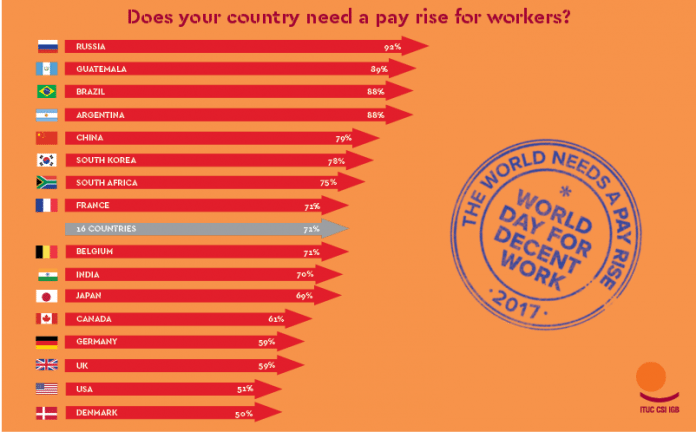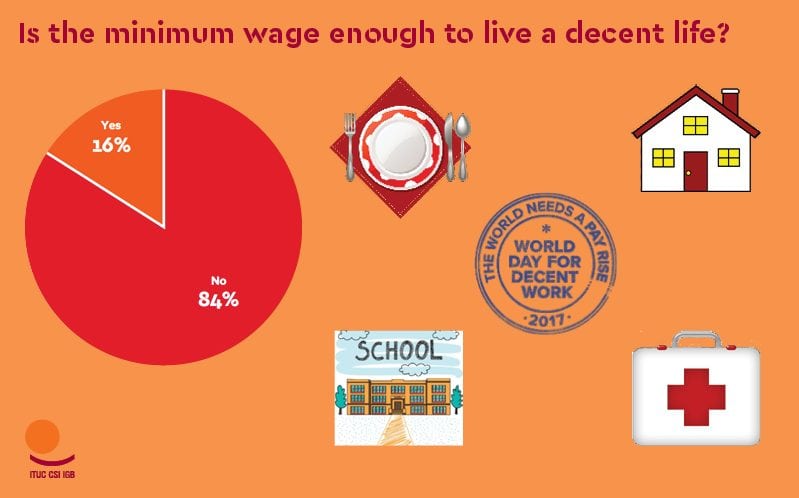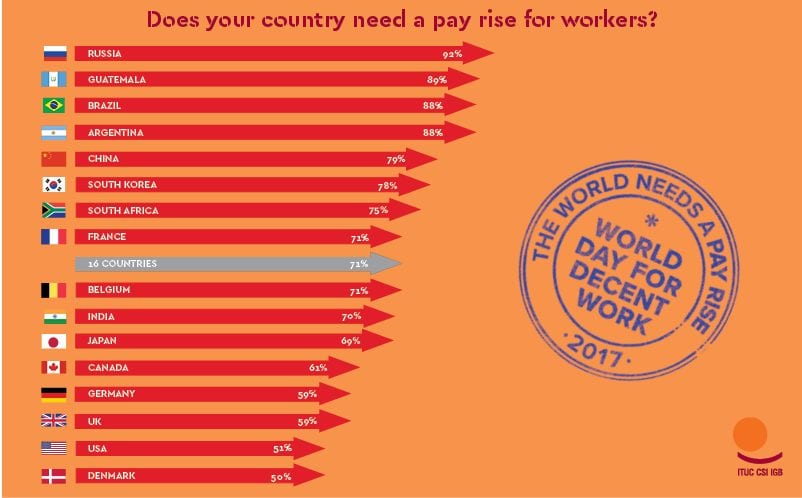
This year marks the 10th World Day for Decent Work on October 7. A day when working people and their unions, backed by community groups, ngos, faith groups and others, push the case for decent jobs – jobs that provide a living wage and the fundamental worker’s rights which have lifted hundreds of millions out of poverty and been the foundation of prosperity for so many.
This year’s World Day takes place against a background of rising insecurity and levels of inequality that are simply staggering. The ITUC’s 2017 Global Poll showed that 84% of people believe that the minimum wage in their country is too low to guarantee a decent life, and that 71% of people want their government to work towards a pay rise for all workers. Of the 60% of workers who have an employment contract of some sort, the majority are in precarious employment or have a justified fear of unemployment just around the corner.
The rules of the global economy are rigged against those who have to work to earn a living, and in favour of multinational corporations and the ultra-rich.

It is no accident that, as Oxfam has revealed, the richest 1% own more wealth than the rest of humanity combined. This is inequality by design. The world is facing a huge decent work deficit, and the rules of the global economy need to change.
The global supply chain model of today is failing to deliver decent jobs and prosperity. Analysis of the workforce in the supply chains of 50 of the world’s largest multinational companies shows that just 6% of that workforce is directly employed. The rest, a “hidden workforce” of 94%, are in frequently precarious and underpaid jobs in a myriad of subcontracting arrangements, with CEOs of the big companies often taking little or no responsibility for the people on whom their bottom line depends.
When we look at the tax affairs of those same companies, most of them are involved in offshore and other tax avoidance schemes that deprive governments of vital revenue for infrastructure, the mounting needs in the care economy and other areas of core government responsibility.
The report also looked at the gross profits of ten of the world’s best-known companies, and what it would cost them to ensure a pay rise of just US$50 per month for all the workers in their supply chains. The calculations show that a modest pay rise like this would make only the tiniest difference in the gross profit line.
For a worker in a Central American plantation, just a couple of cents more on the price of a melon means the difference between poverty and a living minimum wage.

There are signs that governments, and intergovernmental bodies, are beginning to find the courage to implement the rule of law without as well as within their borders. France has introduced a “vigilance” law that requires French multinational companies to conduct due diligence in their supply chains, including on labour standards. While the enforcement provisions of the law should be stronger, it is a beginning and other governments should follow suit and take the next step on compliance. The UK government’s modern slavery act is another case where corporate responsibility is no longer being left to companies themselves to do on a voluntary and rarely effective basis. Other governments doing similar would make a dent in the tens of millions of people who are trapped in modern slavery today, many of them in global supply chains.
Under Germany’s Presidency this year, the Labour Ministers took an important step in their declaration, endorsed by the G20 leaders, when they concluded that “We emphasise that violations of decent work and fundamental principles and rights at work cannot be part of the competition” – part of a broader agenda to clean up the world’s supply chains, and to ensure that minimum wages are sufficient for a decent life. This fits with the decent work benchmark in the UN’s Sustainable Development Goals, and is indeed crucial to attaining them.
The International Labour Organisation has now launched its Global Commission on the Future of Work. No doubt much of the World Economic Forum’s initiatives on the future of production and related issues will help inform the work of that Commission. Trade unions are deeply engaged in this debate, and will strive to ensure that the future of work is decent work, with the global economy serving people and delivering development and prosperity.
The Global Deal initiative, launched by Swedish Prime Minister Stefan Lofven, is a vision for a world of work based on fundamental rights and social dialogue. This is a vision that everyone should share, and we are calling on governments and companies to get on board with it. The consequences of inaction are unthinkable in a strained and fragile global order which for most people is simply not delivering enough, or anything at all.
Trade unions are optimistic by nature, and our observances of the World Day for Decent Work around the globe this Saturday will reflect frustration and anger at the state of the world of work today, and determination to organise and mobilise to change the rules of the global economy.



































